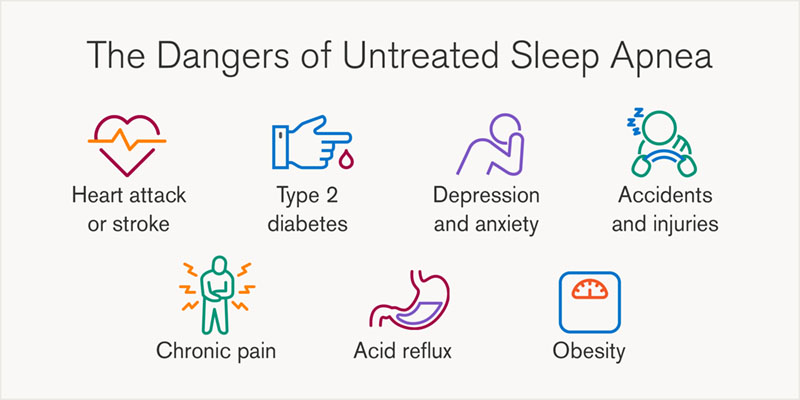The Silent Threat of Sleep Apnea: Why Ignoring Symptoms Can Be Dangerous
December 19, 2024
Categories: ENT/Otolaryngology
Tags: Sleep, Sleep Medicine | Critical Care Medicine, Otolaryngology ENT
 By Sarah Finucane, MD, ENT/Otolaryngology
By Sarah Finucane, MD, ENT/Otolaryngology
Sleep apnea is more than just a noisy nuisance that disrupts your sleep; it's a serious health condition with far-reaching consequences. While snoring may be its most recognizable symptom, the effects of untreated sleep apnea extend well beyond restless nights. If left unaddressed, the sleep disorder can trigger a host of health problems that can shorten your lifespan and diminish your quality of life.
"Sleep apnea is closely linked to serious conditions like high blood pressure, heart disease, and even stroke. Untreated, it creates a lot of strain on the body. It should be taken seriously," says Dr. Sarah Finucane, ENT specialist at Loyola Medicine.
What is sleep apnea?
Sleep apnea is a disorder where breathing repeatedly stops and starts during sleep. These interruptions occur because the airway becomes partially or completely blocked (obstructive sleep apnea) or because the brain fails to send proper signals to the muscles that control breathing (central sleep apnea). The most common type, obstructive sleep apnea, occurs when the throat muscles relax excessively, leading to a narrowed or collapsed airway.
You or your partner may notice these common symptoms:
- Loud snoring
- Choking or gasping during sleep
- Excessive daytime fatigue
- Morning headaches
- Difficulty concentrating
- Mood changes like depression or irritability
As many as 90% of sleep apnea cases remain undiagnosed, meaning millions of people unknowingly live with its harmful effects. However, one symptom by itself may not mean you have the condition.
"While snoring and sleep apnea can go hand in hand, not everyone who snores has sleep apnea. Snoring is caused by vibrating throat tissues, but with sleep apnea, the airway becomes blocked, stopping or reducing airflow completely," says Dr. Finucane.
Who is at risk for sleep apnea?
Sleep apnea doesn’t discriminate, but certain factors can increase your risk:
- Weight: People with a body mass index (BMI) over 30 are at a higher risk due to excess tissue that can obstruct the airway.
- Neck size: A neck circumference over 17 inches in men and 15 inches in women increases risk, as larger necks tend to have narrower airways.
- Gender: Men are more likely to develop sleep apnea, though postmenopausal women without hormone replacement therapy are at increased risk.
- Age: While the sleep disorder can affect people of all ages, the risk increases with age.
- Genetics: A family history of sleep apnea can predispose individuals to the condition.
- Lifestyle factors: Alcohol, smoking, and sedative use can worsen sleep apnea by relaxing throat muscles or irritating the airway.
"Obesity is a significant risk factor for sleep apnea, but it’s not the only one. Neck circumference, jaw structure, and even genetic factors can all play a role. You can be at a normal weight and still have sleep apnea," says Dr. Finucane.
The health toll of untreated sleep apnea
The effects of sleep apnea go beyond feeling tired during the day; ignoring the sleep disorder can have severe, even life-threatening, consequences.

Cardiovascular strain
Sleep apnea forces the body into a state of constant alarm. Each time breathing stops, oxygen levels drop, triggering the release of stress hormones. Over time, these fluctuations strain the heart. Risks include high blood pressure, an irregular heartbeat, heart attack, and stroke. Men with untreated sleep apnea are three times more likely to suffer a stroke.
Type 2 diabetes
Sleep apnea disrupts glucose metabolism, increasing the risk of insulin resistance. Research has shown that there is a strong correlation between obstructive sleep apnea and also having diabetes, creating a vicious cycle of health complications.
Obesity
The relationship between sleep apnea and obesity is circular: obesity increases the risk of sleep apnea, and untreated sleep apnea can lead to weight gain by increasing appetite and promoting fat storage.
Mental health issues
Chronic fatigue from poor sleep contributes to mood swings, depression, and anxiety. Individuals with untreated sleep apnea often report difficulty concentrating and memory problems.
Accidents and injuries
Daytime drowsiness caused by sleep apnea can be as impairing as alcohol intoxication. It can also lead to death, with sleep-deprived drivers accounting for just over 20% of car crash deaths.
Other chronic conditions
- Gastroesophageal reflux disease: The strain on the diaphragm during sleep apnea episodes can worsen acid reflux.
- Chronic pain conditions: Sleep apnea is prevalent in up to 80% of fibromyalgia patients and can worsen pain sensitivity.
Premature death
Perhaps the most alarming statistic: untreated sleep apnea increases the risk of sudden death by 30%.
Why you might not realize you have sleep apnea
One of the challenges with sleep apnea is that its symptoms often occur unnoticed during sleep. A partner or family member may notice gasping or choking sounds during the night, but those who sleep alone may remain unaware. Even daytime symptoms, such as fatigue and headaches, are often dismissed as unrelated or trivial.
Understanding the risks of untreated sleep apnea is the first step in prioritizing your health. Sleep is foundational to well-being, and ignoring sleep apnea symptoms robs your body of the restorative rest it needs to function. If you’re experiencing signs of sleep apnea—or even if you suspect you might be—consulting a health care provider is crucial.
Your life shouldn’t be lived in the fog of fatigue or under the shadow of chronic health risks. By addressing sleep apnea, you can unlock better sleep, improved energy, and a healthier future. Don’t wait—seek help today.
"Many people think they’re just tired because of a busy schedule, but sleep apnea could be the underlying cause. If you’re constantly fatigued even after a full night of sleep, it’s worth looking into," says Dr. Finucane.
Sarah Elizabeth Finucane, M.D., is a dedicated otolaryngologist specializing in the diagnosis and treatment of conditions affecting the ear, nose, throat, and related structures. She is passionate about improving her patients' quality of life by addressing a wide range of issues, from sleep disorders like obstructive sleep apnea to hearing and balance concerns.
Dr. Finucane earned her medical degree from the University of Illinois College of Medicine and completed her residency at Loyola University Medical Center. Her expertise and compassionate care have made her a trusted provider in the community.
Book an appointment today to see Dr. Finucane or another ENT specialist by self-scheduling an in-person or virtual appointment using myLoyola.
